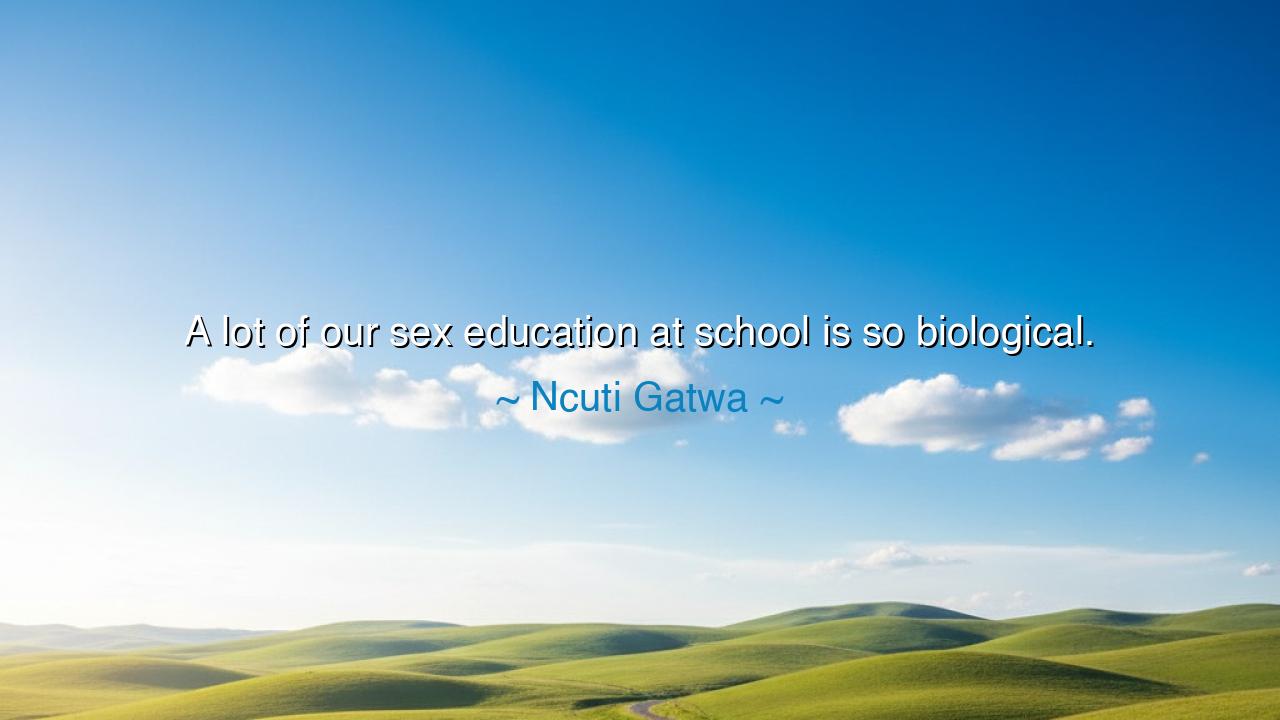
A lot of our sex education at school is so biological.






The words of Ncuti Gatwa, actor and storyteller, fall like a quiet revelation upon the hearts of those who listen: “A lot of our sex education at school is so biological.” At first glance, these words seem simple—an observation about what is missing from the lessons of youth. Yet beneath their surface lies a profound lament for what modern education too often forgets: that human intimacy, love, and desire are not mere matters of anatomy, but of soul, empathy, and understanding. In this reflection, Gatwa reminds us that knowledge without humanity is sterile, that the teaching of the body must also include the teaching of the heart.
To understand the depth of his words, we must look at their origin. Ncuti Gatwa, known to the world through his role in the series Sex Education, grew up navigating the tensions between culture, identity, and acceptance. His words were not the idle musings of an actor, but the lived wisdom of a man who had seen how society speaks much of the body but little of the spirit. In schools, children learn of cells and organs, of hormones and reproduction. They are taught the mechanics of life but not its tenderness, the science of creation but not the ethics of connection. Gatwa’s statement is thus both critique and cry—a call for education that teaches not just how life begins, but how love should be honored.
This separation between biology and humanity is not new. For centuries, societies have feared to speak openly of intimacy, cloaking it in silence or reducing it to utility. Even in the ancient world, where philosophers like Plato and Aristotle explored the nature of love, the physical and the spiritual were often divided. Plato spoke of Eros—love as the force that lifts the soul toward beauty—but this vision was later overshadowed by moral restraint and scientific reduction. In time, what was once sacred became clinical, and what was once a dialogue of hearts became a lesson in diagrams. Gatwa’s lament is, in truth, an echo of a much older sorrow: that humanity, in its quest for control, has forgotten to teach its children what it means to be fully human.
For what, after all, is sex education if it teaches only the function and not the meaning? To teach a young person the anatomy of reproduction but not the sanctity of respect is to hand them a tool without wisdom. The ancients knew that knowledge alone does not ennoble—it must be guided by virtue. The Stoic Epictetus taught that every human act should align with dignity and reason, for mastery of the body without mastery of the mind leads only to chaos. In the same way, Gatwa’s insight reminds us that the education of love must be moral as well as material, emotional as well as empirical. For love is not a formula to be memorized, but a craft to be lived with grace and humility.
Consider a real story that mirrors this truth. In the early twentieth century, Maria Montessori, the great educator, sought to reform how children learned about life and the body. She believed that to teach the physical without nurturing the moral was to raise beings of knowledge but not of wisdom. In her classrooms, children learned about growth, relationships, and empathy alongside science. She taught that understanding the body was sacred because it was tied to self-respect and the respect of others. Montessori’s vision, like Gatwa’s, reminds us that education should not stop at the flesh—it must reach into the heart of the human condition, teaching compassion, equality, and integrity alongside the facts of biology.
Gatwa’s words also speak to the loneliness of modern youth. Surrounded by information yet starved for guidance, they inherit a world where desire is commodified but emotion is neglected. They know the body’s mechanics but not its meaning; they are told what to do, but not how to be. To remedy this, Gatwa’s call must be heard as a demand for holistic education—one that speaks to the human spirit as much as the human form. Such teaching would address not only the how of intimacy, but the why: why respect matters, why consent ennobles both giver and receiver, why love must never be divorced from responsibility.
Thus, the lesson of Ncuti Gatwa’s insight is both ancient and urgent: education must heal the divide between body and soul. We must teach our children not only what the human body can do, but what the human heart must guard. The study of life must be filled with reverence, not shame; with honesty, not fear. Teachers and parents alike should speak openly of affection, of kindness, of self-worth, and of the sacred duty to cherish one’s own dignity and that of others. For only then will education cease to be mechanical and become moral—only then will it serve not just the intellect, but the soul.
In the end, Gatwa’s words carry the quiet strength of a prophet’s reminder. To teach the biology of life without the morality of love is to build knowledge without wisdom. True education, he tells us, must be a union of both—the science of the body joined with the art of compassion. Let the future therefore be guided by this truth: that every lesson about life should begin and end in love. For when knowledge and empathy walk hand in hand, then, and only then, shall humanity truly know itself.






AAdministratorAdministrator
Welcome, honored guests. Please leave a comment, we will respond soon